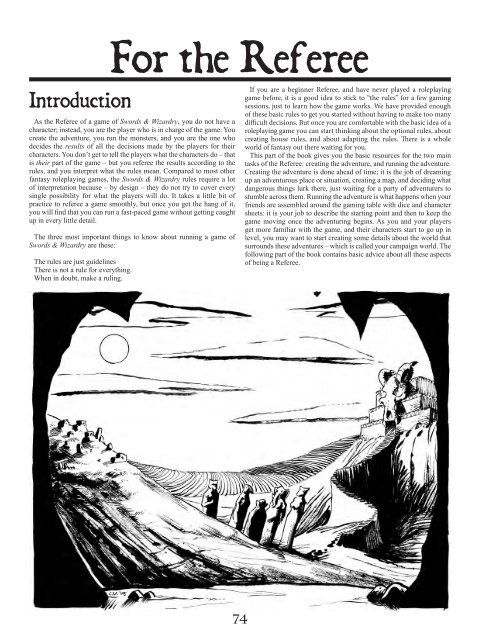Swords-Wizardry-Complete-revised
Swords-Wizardry-Complete-revised
Swords-Wizardry-Complete-revised
Create successful ePaper yourself
Turn your PDF publications into a flip-book with our unique Google optimized e-Paper software.
For the Referee<br />
Introduction<br />
As the Referee of a game of <strong>Swords</strong> & <strong>Wizardry</strong>, you do not have a<br />
character; instead, you are the player who is in charge of the game. You<br />
create the adventure, you run the monsters, and you are the one who<br />
decides the results of all the decisions made by the players for their<br />
characters. You don’t get to tell the players what the characters do – that<br />
is their part of the game – but you referee the results according to the<br />
rules, and you interpret what the rules mean. Compared to most other<br />
fantasy roleplaying games, the <strong>Swords</strong> & <strong>Wizardry</strong> rules require a lot<br />
of interpretation because – by design – they do not try to cover every<br />
single possibility for what the players will do. It takes a little bit of<br />
practice to referee a game smoothly, but once you get the hang of it,<br />
you will find that you can run a fast-paced game without getting caught<br />
up in every little detail.<br />
The three most important things to know about running a game of<br />
<strong>Swords</strong> & <strong>Wizardry</strong> are these:<br />
The rules are just guidelines<br />
There is not a rule for everything.<br />
When in doubt, make a ruling.<br />
If you are a beginner Referee, and have never played a roleplaying<br />
game before, it is a good idea to stick to “the rules” for a few gaming<br />
sessions, just to learn how the game works. We have provided enough<br />
of these basic rules to get you started without having to make too many<br />
difficult decisions. But once you are comfortable with the basic idea of a<br />
roleplaying game you can start thinking about the optional rules, about<br />
creating house rules, and about adapting the rules. There is a whole<br />
world of fantasy out there waiting for you.<br />
This part of the book gives you the basic resources for the two main<br />
tasks of the Referee: creating the adventure, and running the adventure.<br />
Creating the adventure is done ahead of time; it is the job of dreaming<br />
up an adventurous place or situation, creating a map, and deciding what<br />
dangerous things lurk there, just waiting for a party of adventurers to<br />
stumble across them. Running the adventure is what happens when your<br />
friends are assembled around the gaming table with dice and character<br />
sheets: it is your job to describe the starting point and then to keep the<br />
game moving once the adventuring begins. As you and your players<br />
get more familiar with the game, and their characters start to go up in<br />
level, you may want to start creating some details about the world that<br />
surrounds these adventures – which is called your campaign world. The<br />
following part of the book contains basic advice about all these aspects<br />
of being a Referee.<br />
74


